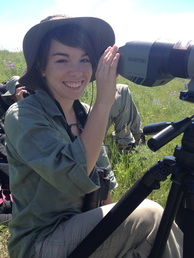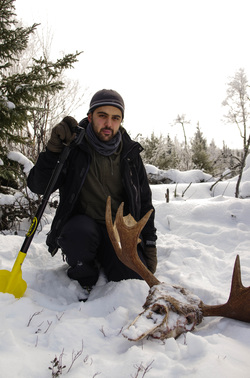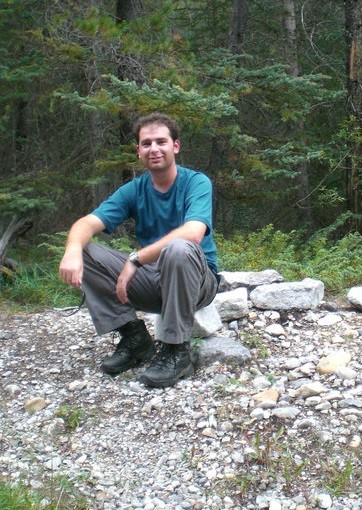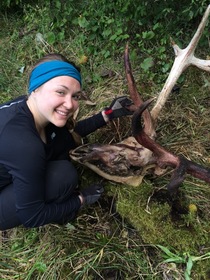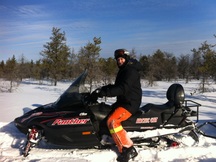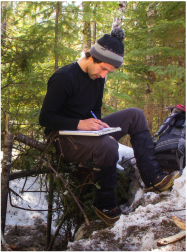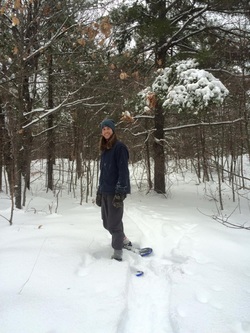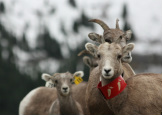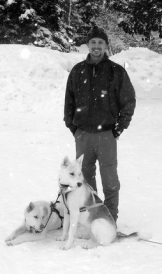
Eric Vander Wal
MSc Lakehead University | PhD University of Saskatchewan | NSERC PDF Université de Sherbrooke
My passion for evolutionary ecology stems from growing up in the bush in northwestern Ontario. From watching ant social interactions in my back yard to caribou foraging on the Slate Islands, it was these formative experiences that shaped the way I currently tackle fundamental and applied questions in evolutionary ecology.
MSc Lakehead University | PhD University of Saskatchewan | NSERC PDF Université de Sherbrooke
My passion for evolutionary ecology stems from growing up in the bush in northwestern Ontario. From watching ant social interactions in my back yard to caribou foraging on the Slate Islands, it was these formative experiences that shaped the way I currently tackle fundamental and applied questions in evolutionary ecology.
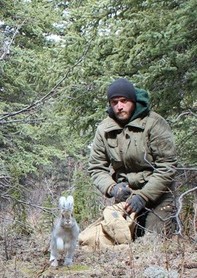
Chris Hart (chart[at]mun[dot]ca)
MSc Candidate
A fascination with wildlife and a growing curiosity for how they interact with their environment are the driving factors behind my research. My main interests involve the habitat and resource selection processes that drive animal movements and behaviours. My project investigates the effect of changing population density on these processes and how this relates to the connectivity among populations within a meta-population. I will be working in partnership with Isabelle Schmelzer and the NL Wildlife Division to apply my question to the different herds that make up the caribou population of southern Labrador. As a threatened population we need to learn more about how they are using the land available to them, and how this changes over time. Gaining an understanding of the evolutionary ecology of species at risk can have important implications for conservation and management practices.
MSc Candidate
A fascination with wildlife and a growing curiosity for how they interact with their environment are the driving factors behind my research. My main interests involve the habitat and resource selection processes that drive animal movements and behaviours. My project investigates the effect of changing population density on these processes and how this relates to the connectivity among populations within a meta-population. I will be working in partnership with Isabelle Schmelzer and the NL Wildlife Division to apply my question to the different herds that make up the caribou population of southern Labrador. As a threatened population we need to learn more about how they are using the land available to them, and how this changes over time. Gaining an understanding of the evolutionary ecology of species at risk can have important implications for conservation and management practices.
|
Maegwin Bonar (m.bonar[at]mun[dot]ca)
MSc Candidate My desire to answer exciting questions in evolutionary ecology as well as a passion for using innovative spatial analysis and statistical techniques are the factors driving my research here in the WEEL lab. My project examines the fitness consequences of seasonal aggregation by female caribou on calving grounds. Female caribou choosing to aggregate on calving grounds balance foraging opportunities with predation risk for their offspring. By taking an individual-based approach, using caribou as a model system, I will examine the influence of the interaction between seasonal aggregation and population density on calf survival. I will be using caribou data from insular Newfoundland as well as collecting data from caribou on Fogo Island, Newfoundland. Maegwin on ResearchGate |
|
Sana Zahibi-Seissan (szs531[at]mun[dot]ca)
MSc Candidate With a background in wildlife rehabilitation and conservation, I have always been fascinated by questions related to space use and animal behaviour. My research questions revolve around space and resource use, and how it relates to social dynamics and cohesiveness. Working in partnership with Parks Canada, I am looking into the relationship between wolf group structures and the available prey base in Riding Mountain National Park in Southwestern Manitoba. Being an insular piece of wilderness surrounded by agriculture, it is important to further gain understanding into the predator-prey dynamics in such areas subjected to anthropogenic effects. Understanding the response of predator populations to differing prey species availability will help strengthen our understanding of ecosystems as a whole and has important implications for conservation and resource management. |
|
Mike Laforge (m.laforge[at]mun[dot]ca)
PhD Candidate A passion for understanding animal movement ecology has led me to a PhD position in the Wildlife Evolutionary Ecology Lab. Climate change is resulting in many species failing to match the timing of important seasonal events (e.g., reproduction) to those of critical resources—a phenological mismatch. My project will involve examining migration patterns in Newfoundland caribou in order to examine how climate change is affecting migration timing and subsequently reproductive success of female caribou. My project takes an individual-based approach to the question of phenological mismatch, by examining the consistency and plasticity of migration behaviour across a gradient of environmental conditions. My project will also use collared individuals on Fogo Island, NL to further investigate the role of plant green-up on caribou vital rates. Mike's website |
|
Christina Prokopenko (cmprokopenko[at]mun[dot]ca)
PhD Candidate An early fondness for science, animals, and wilderness lead me to pursue a career in wildlife ecology. My high esteem for management oriented science grew at the University of Alberta where I studied the response of elk to roads on their winter range for my Master’s degree. My PhD project is examining wolf-ungulate dynamics in Riding Mountain National Park in southwestern Manitoba. I will be studying the strategies that predators (wolves) and their prey (elk) use to increase their success in the predator-prey game, including prey selection, sociality, and space-use behaviour. The knowledge we gain from studying the relationship between these keystone species will inform future conservation and management decisions. Twitter: @proko_eco Christina on ResearchGate |
|
Quinn Webber
PhD Candidate I joined the lab at MUN as a PhD student in spring 2016 after completing a MSc at The University of Winnipeg where I studied how personality and sociality influence disease dynamics in bats. For my PhD I am examining the relationship between sociality, habitat selection, and fission-fusion dynamics using ungulate systems as a model, for example, caribou in Newfoundland. For up to date information check out my website |
|
Daniel Dupont
PhD Candidate (part-time) (Start date September 2016) The boreal shield in eastern Manitoba is home to wolves and a prey guild composed mainly of moose, white-tailed deer and beaver. My project consists primarily of determining kill and predation rates of wolf packs in eastern Manitoba through kill site investigations. In addition to examining predator-prey dynamics, I will also be examining the potential effects of parasite transmission between white-tailed deer and moose in hopes to better understand the sometimes complex relationship between wolves, moose and white-tailed deer in the region. |
Undergrads et al.
|
Paul O'Brien NSERC USRA | Honours My interests include population biology and behavioural ecology and the processes they involve. Specifically, I am fascinated with the influence animal behaviours can have on population level processes and vice versa. My project examines the effects of changing conspecific density on the social behaviour of elk. By employing the use of social network analysis and a number of network metrics, I quantified consistent individual differences in social connectivity. My research has applications to wildlife management, particularly with respect to disease transmission, hunting, and climate change. |

